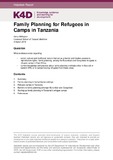| dc.contributor.author | Millington, Kerry | |
| dc.coverage.spatial | Tanzania | en |
| dc.date.accessioned | 2019-03-26T10:39:01Z | |
| dc.date.available | 2019-03-26T10:39:01Z | |
| dc.date.issued | 2019-03-04 | |
| dc.identifier.citation | Millington K.A. (2019). Family planning for Refugees in Camps in Tanzania. K4D Helpdesk Report. Brighton, UK: Institute of Development Studies | en |
| dc.identifier.uri | https://opendocs.ids.ac.uk/opendocs/handle/20.500.12413/14426 | |
| dc.description.abstract | Refugees have the right and a need to access sexual and reproductive health (SRH) services, including family planning. SRH services saves lives yet access to quality SRH services decreases during humanitarian crises as these services are compromised. In general, they are underfunded and overlooked or deprioritised, even as demand for these services increases with refugees wanting to prevent having children due to their situation and lack of family support, and an increased risk of forced sex, risk-taking behaviours and exposure to high-risk situations. Tanzania hosts around 300,000 refugees mostly from the Democratic Republic of Congo (DRC) and Burundi in three camps, Nyarugusu, Mtendeli and Nduta, located in the Kigoma Region in northwest Tanzania. These camps extend beyond original capacity, having had to cope with a large and rapid influx of Burundians. They offer minimal SRH services and do not provide a safe environment for women and girls who experience sexual violence on the way to/from latrines and showers and whilst collecting water for drinking and washing and firewood for cooking outside the camp, owing to limited camp supplies. There remains therefore opportunity to scale up quality SRH services and improve safety and security related to camp infrastructure and services. Understanding barriers to family planning uptake in the countries from which the refugees in the Tanzanian camps fled could help understand barriers to be faced in scaling up family planning in these camps where specific evidence is minimal. Barriers preventing uptake of modern contraception among women and men in the DRC include socio-cultural norms (especially the husband’s role as primary decision-maker and the desire for a large family), poor spousal communication, fear of side-effects and a lack of knowledge. Many of the women studied though were open to using a modern family planning method in the future offering potential for positive changes in behaviour and perceptions of contraceptive use. | en |
| dc.language.iso | en | en |
| dc.publisher | IDS | en |
| dc.relation.ispartofseries | K4D Helpdesk Report;551 | |
| dc.rights.uri | https://www.nationalarchives.gov.uk/doc/open-government-licence/version/3/ | en |
| dc.subject | Health | en |
| dc.subject | Rights | en |
| dc.subject | Sexuality and Development | en |
| dc.title | Family Planning for Refugees in Camps in Tanzania | en |
| dc.type | Other | en |
| dc.rights.holder | © DFID - Crown copyright 2019 | en |
| dcterms.dateAccepted | 2019-03-04 | |
| rioxxterms.funder | Department for International Development, UK Government | en |
| rioxxterms.identifier.project | K4D | en |
| rioxxterms.version | VoR | en |
| rioxxterms.funder.project | 238a9fa4-fe4a-4380-996b-995f33607ba0 | en |

